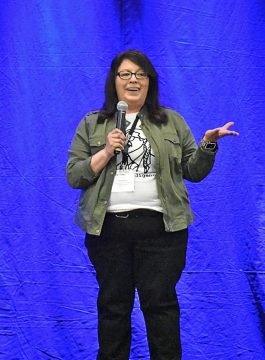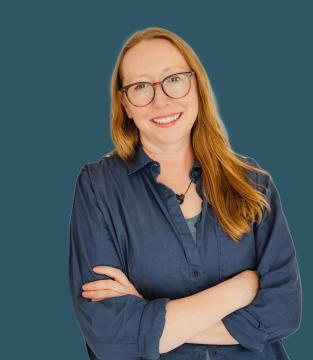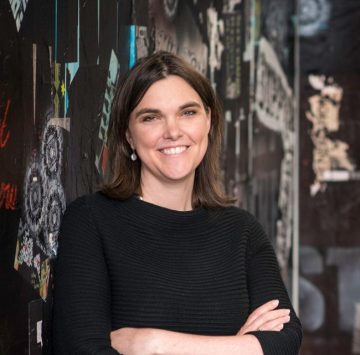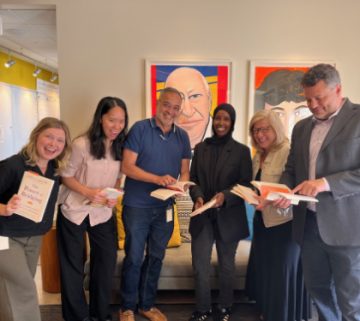Story
Building Dynamic Data
Bush Fellow Anita Frederick uses data to improve lives in her tribal nation
DATE
June 1, 2023

By Natalia Mendez
Data drives Anita B. Frederick (BF’09). As a member of the Turtle Mountain Band of Chippewa Indians (TMBCI), she has learned firsthand the importance of accurate data and how populations can be underserved when research is lacking. Issues go undocumented and patterns cannot be identified without evidence or documentation—for example, about the extent to which fresh food access may factor into community health. For years, Indigenous populations have been excluded from the process of gathering and reviewing data, leaving gaps and a lack of representation. That’s why Frederick focuses on gathering data to improve the lives of those in her tribal nation in Belcourt, North Dakota, as well as other tribal nations.
Frederick’s journey to dig for data began in 1995 when she worked at Turtle Mountain Community College for 18 years. While there, she managed the student information systems as the dean of students. “I was always really interested in information systems and what they could do for us as people,” she says.
I wanted to make a difference for my people. I wanted to see change. I wanted to help make that change happen.
Anita Frederick
After receiving a Bush Fellowship, Frederick began dissertation work and found a lack of data on tribal nations. “I would always see these huge gaps in the data — what was reported in the Census [and in] public databases. I’d be like, well, that’s not even right. That’s not representative of us as people.”
Frederick says she wanted to see a version of herself in the data but didn’t. When others suggested she use data from other populations, like Latina/o/x and Black communities, she understood that the experiences of other marginalized identities — while important — could not encompass or be equivalent to the experience of Native communities. In this glaring lack of representation, Frederick found an opportunity to create specialized data for her community.
,
Connecting Data to Community
As part of her Fellowship, Frederick says she made strong connections with others that led to new opportunities. “My Fellow mates were doing such amazing community work,” Frederick says. “They were making a difference in their local, state, regional, and some worldwide communities. This is what I wanted. I wanted to make a difference for my people. I wanted to see change. I wanted to help make that change happen. The knowledge and experiences I gained through my Fellowship, along with the opportunity to have two amazing mentors, Dr. Carol Davis and Dr. Carty Monette, gave me the courage to step away from what I knew and what I was comfortable with, and pursue my work with my community.”
Frederick continued to work with Davis, Monette, and Dr. Paula Morin Carter, and together in 2013, they created the Tribal Nations Research Group (TNRG) with a mission “to improve the quality of life for all tribal members through culturally competent, custom-fit research.”
Establishing a process gave the Tribe more control over the research and data being collected on the community’s people, land, and natural resources. Through its work, TNRG has established a tribal data center and Tribal Research Review Board that regulates all research conducted on the Turtle Mountain Reservation, which today includes a research database, secondary data sources, and custom data. Frederick says, “Having this data provides us an opportunity to build our own research capacity and continue to understand the conditions into which people are born, grow, live, work, and age in our community. … It was an opportunity for us to build our research infrastructure like our regulatory infrastructure by establishing laws to say who, when, and how research can be conducted on the Reservation.”
,
In her initial research, Frederick found that there were only 45 studies representing TMBCI conducted in the 1970s and ’80s — a very low number for an entire population of people native to the continent. Protocol that TNRG created ensured that research and data collection would be transparent for participants and the Tribe, which could build trust with those participating in the data collection. Additionally, it ensured that culture, languages, land, and resources were all respected. The research needed to be mutually beneficial for both the researchers and Tribe.
As TNRG has made significant strides in their work, they have received multiple grants from the Bush Foundation over the years. This includes an Ecosystem grant, in recognition of their important role in helping others to make change happen. Lyndsay Ulrickson, grantmaking officer and enrolled member of TMBCI, says, “Anita and her team bring community together using critical data and analysis that has historically been unavailable. This essential work supports community problem-solving and Native nation-building in our region.”
As for Frederick’s Bush Fellowship, she explains, “The Bush Fellowship invested in me as an individual. The selection process was intense, so I knew I had to use the Fellowship to learn some lifelong skills that would benefit me and my community. So, at each in-person meeting and online discussion, I soaked everything in. I would always reflect and think about what I learned and how I can share what I learned. My approach to leadership is always to establish a plan. I make it clear that we are in this process together and that everyone is equal on the team. This creates a sense of ownership, partnership, and family. Together we move forward.”
,
She continues, “Community change also needs involvement from tribal government and other organizational leaders in a community. Establishing relationships and respecting these individuals and their role in the community is important. Respect goes a long way when working with tribal communities.”
Anita echoes the importance of leveraging community as a tool for collective change. “At TNRG, I truly feel that I am making a difference in my community and other tribal communities,” she says. “I have friends and colleagues across the country that I can reach out to and talk through a problem with, ask for advice from, or run through an idea with. This is what I really feel the Bush Fellowship is all about. It was about growing the person who can then grow the community.”
Improving Data to be Responsive to Communities
Always an educator, Frederick continues to engage and explain the importance of data to those in her community so they can better understand the impact of their input. She recognizes that gathering data requires willing subjects, so she engages residents by presenting her Data Matters conferences.
,
As part of the conferences, Frederick lays out the process of gathering data and explains the positive impacts of participation. “I think that’s kind of the way we’ve been changing things systemically—[by] putting in codes, working with our tribal government to enhance laws that have already been in place, and by demonstrating how that would be more beneficial to our community,” she says.
,
Her work does not go unnoticed. Joseph Eltobgi, former executive director of the TMBCI Pathways to Prosperity Program and current program director for the Native Governance Center, shared how powerful the impact of the Data Matter conferences is. “She actually highlighted the organization that I was working for and talked about evaluation and the importance of monitoring and using data to inform decision-making,” Eltobgi says. “The emergence of Tribal Nations Research Group was very impactful. For the first time, we were having a great opportunity to engage and survey the community in a way that we hadn’t ever really done before.”
In 2016, with the help of Stephanie Jay, a tribal health educator at the Turtle Mountain Public Health Department, Frederick and the TNRG set out to gather data about the community’s health with the Public Health Department and the Centers for Disease Control and Prevention. “We both understand the importance of data-driven decisions. Without data, you cannot make an effective community health plan,” Jay says. Using data, they together learned that a lack of access to fresh fruits and vegetables and financial access exacerbated the community’s high rates of diabetes, high blood pressure, heart disease, and cancer.
Their exploration of tribal health led to a food sovereignty assessment. The food sovereignty assessment, in turn, led to the development of a food code that promoted traditional foods and supported local growers. The food code is a set of tribal laws that ensure traditional foods and medicines are protected. It addresses the harvesting, growing, and processing of food products derived from wild animals and plants harvested by members of TMBCI within the Tribe’s Ceded Territories for the purpose of decreasing incidences of chronic disease while promoting the health and well-being of members of TMBCI, and to promote overall wellness.
By the time the pandemic arrived in 2020, TMBCI’s ability to connect with the community, plus their previous partnership with the CDC, allowed them to gather data swiftly and reliably. Jay explains, “We knew we couldn’t do in-person surveys because of the pandemic, so we said, ‘Let’s do it online.’ I told her we could do this because we have an epidemiologist. I have this team. So, we went forward and created an online version for our community.” Jay says the team put the online survey on their social media channels and collected 638 valid responses, representing about 5% of the population.
,
“It’s amazing that our epidemiologist was able to analyze the data and come up with a 43-page community health assessment report for us,” Jay adds.
Although she has garnered numerous accolades for her work, including being named an Association of Institutional Researchers Data Policy Institute Fellow and the recipient of the 2016 National Indian Health Board Local Impact Award, Frederick often cites the teamwork with likeminded individuals as key to her success.
“I think, for me, it’s about getting our community involved, getting other partnerships and people involved, and the right people at the table,” Frederick says.
Jay has witnessed this firsthand. “When I hit a challenge or a barrier, the first person that I contact is Anita. Anita is a champion in so many different areas. I admire her leadership in our tribal community, with her passion for data and her wanting to improve the lives of our tribal community members, whether it’s economic development, health, or providing more resources.”
Eltobgi adds, “She prioritizes the goals of the project and the group to share ideas and to be a part of solutions instead of just driving things herself. She’s always open to discussion, which is something that I really admire about her.”
Even while on vacation, Frederick thinks about ways to make life better back home. On a recent trip to the Ryman Center in Nashville, Tennessee, she saw a hologram telling a story. Her first thought was, “How could we [use this technology to] bring one of our leaders to life and put it in our heritage center? Our kids can learn from our traditional leaders. There’s so much in technology and data and virtual reality and artificial intelligence. That’s all data, and we could do so much with that.”
Natalia Mendez (they/them) is a queer Chicanx writer, photographer, instructor, and lifelong Midwesterner. They love to eat, travel, and explore, preferably on two wheels. They love to help explore and expand stories about local history, food, travel, entertainment, the outdoors, and marginalized identities.
Continue reading
-

News
Welcome to new Bush staff members
We are celebrating some new Bush colleagues and hope you get to meet them soon!
-

Note from Jen
Protecting our freedom to give
Do you know how CPR came to be? What about the 911 system? Ever wonder who developed the Pap smear? Or why school buses are all the same color? All these were the results of work funded by some foundation.
-

News
Introducing the Bush book club
Join us as we learn how to build a world where we all belong. And stay tuned as we get ready to welcome john a. powell to Minnesota for a special Bush book club event!